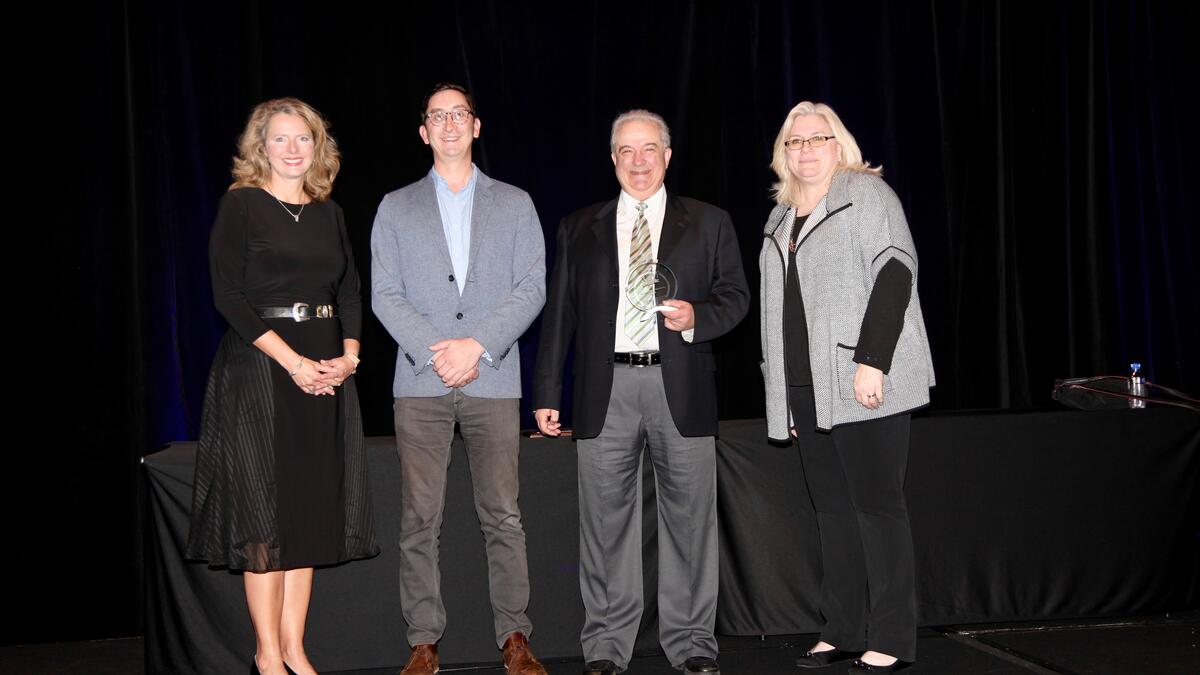ASU honored with digital learning innovation award

Jason Denison (middle left), platform manager for EdPlus at ASU, and Fabio Milner (middle right), associate dean of graduate initiatives for ASU's College of Liberal Arts and Sciences and director of mathematics for STEM education, accept the Digital Learning Innovation Award on ASU's behalf at the 2018 Online Learning Consortium Accelerate conference.
Arizona State University’s School of Mathematical and Statistical Sciences and EdPlus at ASU have been awarded the Digital Learning Innovation Award at the 2018 Online Learning Consortium Accelerate conference. The university was honored in the institutional category, an award that was “designed to recognize the changes institutions are making across multiple courses and programs to integrate digital courseware in order to reduce the barriers of academic success for all students.”
ASU received the award for its transformation of the College Algebra course, in which the School of Mathematical and Statistical Sciences eliminated its developmental math course and began utilizing adaptive learning courseware to ensure students reach the maximum level of success.
Following an analysis of academic challenges students faced in developmental math and the College Algebra course, the math faculty worked with EdPlus’ educational technology experts to develop a new solution that changed the way ASU teaches the course.
First, the faculty decided to eliminate the developmental math course. This was due to the fact that while students may do well in the course, they were also more likely to fall behind in their degree program and drop out of the university at a higher rate than other students. The developmental math course was designed for students who needed College Algebra for their degree program, but did not score high enough on their math placement test to enroll directly into the course. Data also showed that how a student performed in developmental math offered no demonstrable benefit in their College Algebra course outcomes.
Second, faculty recommended the implementation of an adaptive learning math program. Adaptive learning courseware delivers instructional resources and assessment activities to help students master the learning objective of each lesson. The systems collect data on student progress and performance and provide a recommendation on the lesson or content selected to help each student learn as effectively and efficiently as possible.
According to Dale Johnson, adaptive program manager for EdPlus at ASU, “the adaptive and active learning approach is enabling student success at ASU by using adaptive courseware to deliver the right lesson to the right student at the right time, and then using active learning techniques during class to help students develop their applied problem-solving skills.”
After analyzing several adaptive courseware systems, ASU selected and configured McGraw Hill Education’s ALEKS platform for use by all students enrolled in the class.
“The benefit of integrating ALEKS into the course is that each student now has a personalized study path through the material,” Johnson said. “The adaptive courseware enabled the math faculty to realize their dream of providing more personalized instruction at scale by delivering the right lesson to each student, helping them master the material at their own pace.”
Douglas Williams, principal lecturer in the School of Mathematical and Statistical Sciences, believes the changes made within the College Algebra course, along with the implementation of ALEKS, provided faculty with new instructional methods that require students to learn and master the material rather than just memorize.
“Using an adaptive system allows us to reach students through the use of technology, which is an area where they are comfortable. It also allows us to better track student success and how long it is taking students to move through the course,” Williams said. “Through the implementation of ALEKS, students also learn how to be more proactive in their studies, which benefits them not just in the math course but in other areas as well, such as reading.”
Finally, the faculty created the flexibility of a “stretch” semester, which gives students the ability to continue working their way through the curriculum into a second semester if they were not able to finish it within one.
Since the implementation of these changes in fall 2016, ASU has achieved a 20 percent increase in the student success rate when compared to previous years. This translated into an additional 800 students passing the course in the first year.
“Our increased student success in College Algebra is a great example of how adaptive technology can meet individual learning needs at scale,” Johnson said.
More Arts, humanities and education

ASU professor's project helps students learn complex topics
One of Arizona State University’s top professors is using her signature research project to improve how college students learn…

Award-winning playwright shares her scriptwriting process with ASU students
Actions speak louder than words. That’s why award-winning playwright Y York is workshopping her latest play, "Becoming…

Exceeding great expectations in downtown Mesa
Anyone visiting downtown Mesa over the past couple of years has a lot to rave about: The bevy of restaurants, unique local shops…

